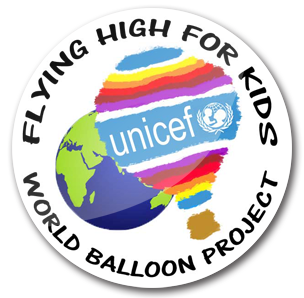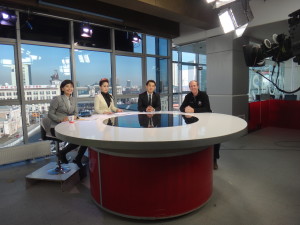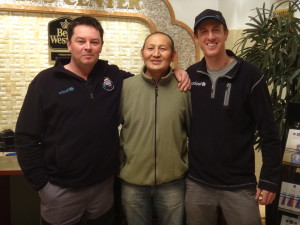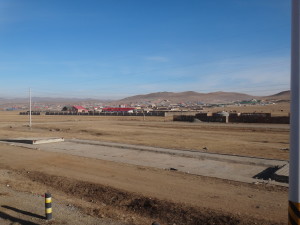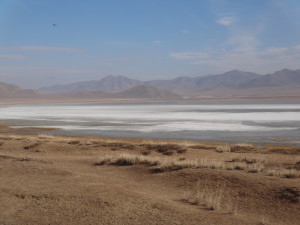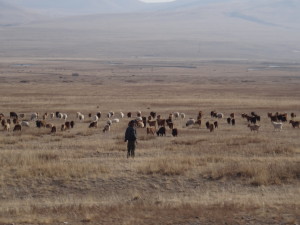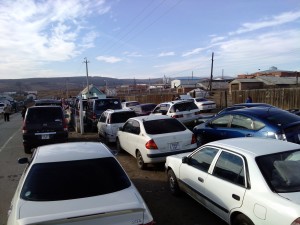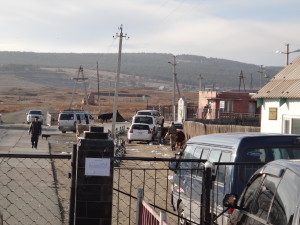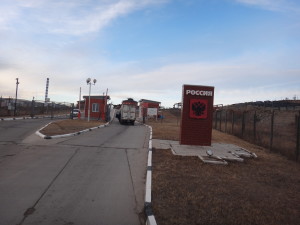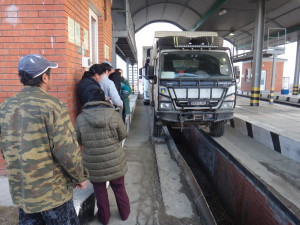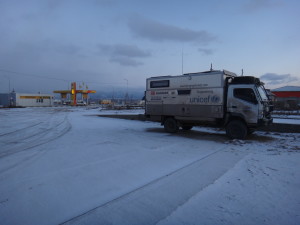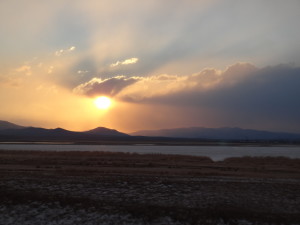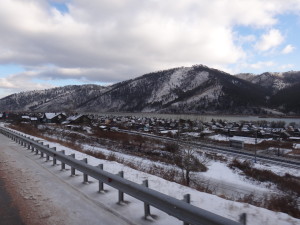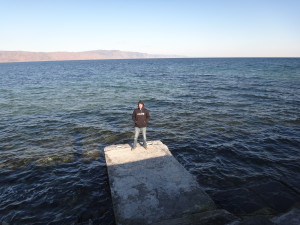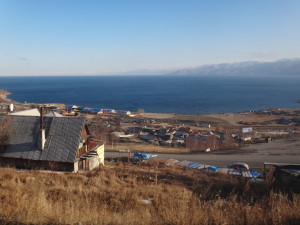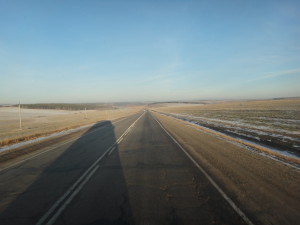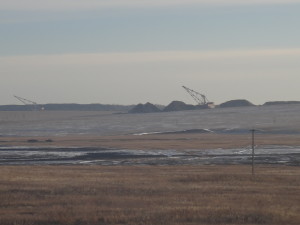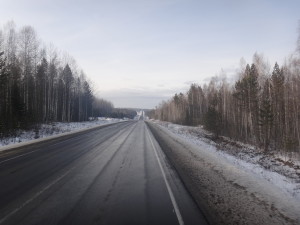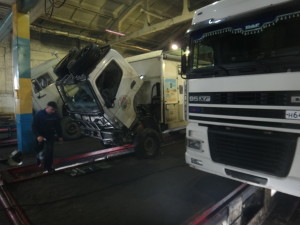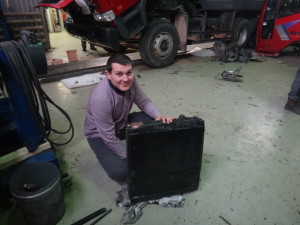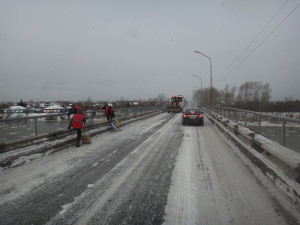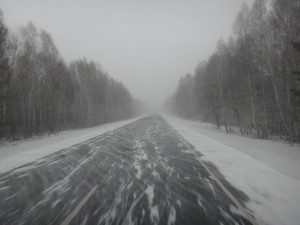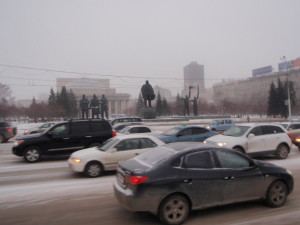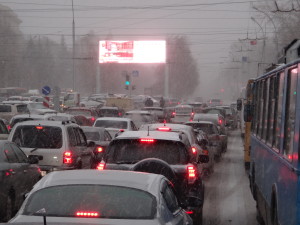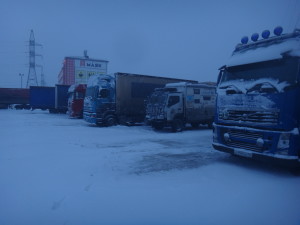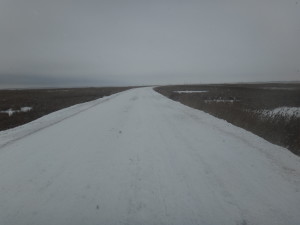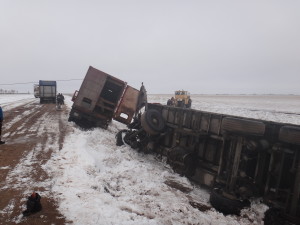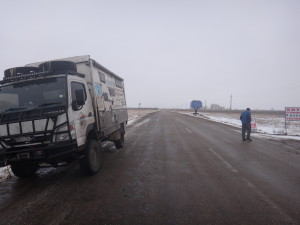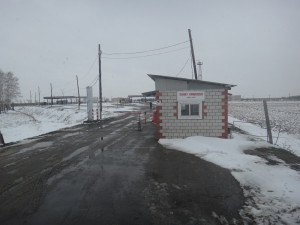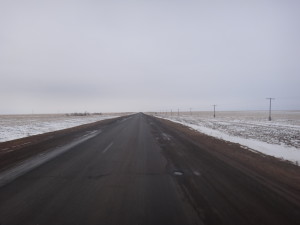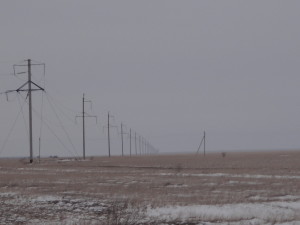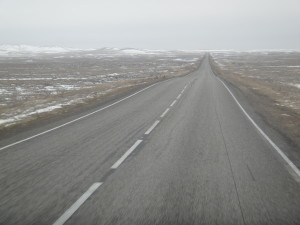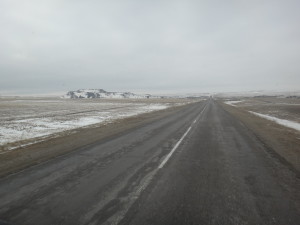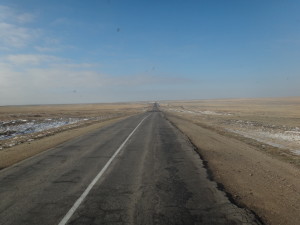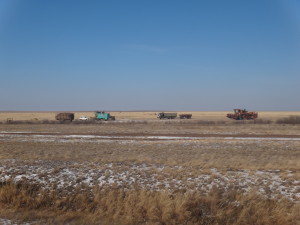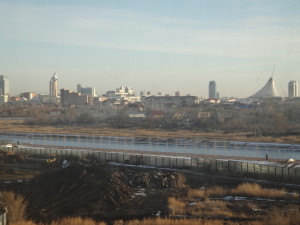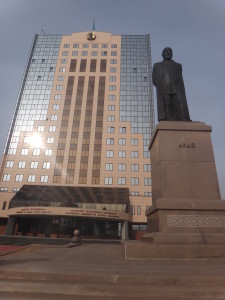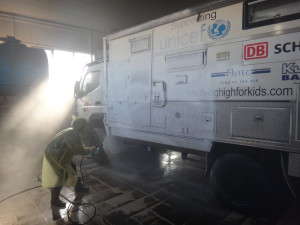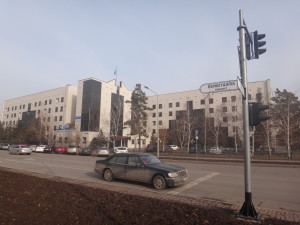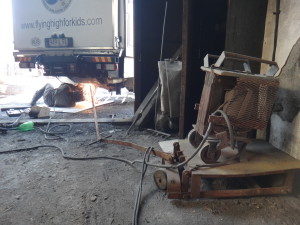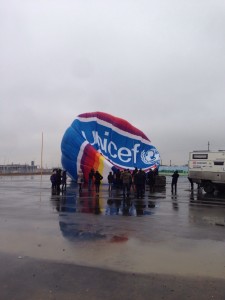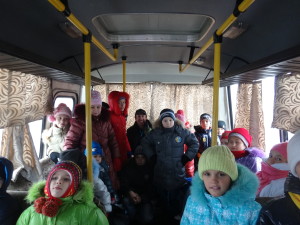Traversing Siberia
More Adventures in China and Mongolia
October 19, 2014Kazakhstan and travelling south
November 19, 2014The right starter motor finally arrived from the USA and was installed in the truck. It was great to be able to start it without having to push it, roll it down a hill or tow it. Such small things can make life so much easier. I now know what it was like to have a vehicle from the 1920’s or before
After a TV interview, we said our goodbyes to the great staff at the Best Western Gobi Kelso in Ulaanbaatar. They had looked after us so well and had generously let me stay almost for free.
We travelled north towards the Russian border. Originally I had planned to travel west across Mongolia, but due to all the difficulties with the truck, I decided to take the safe route through Russia which is sealed and more populated.
We had spent two weeks in Ulaanbaatar, so I was happy to move on and into the wild wide open spaces of Mongolia again.
The road north was largely good though there were some rough spots. The road was under construction in parts, which meant going offroad and picking your own path. North of Ulaanbaatar seemed to be more populated than the south, (Populated meaning sporadic small villages and the odd nomadic farmer with his cows, horses, sheep or goats).
The countryside was mainly flat, though there were quite a few rolling hills and a few frozen lakes. We were often travelling close to the railway line to Russia.
We reached the Mongolian/Russian border in the afternoon. A number of cars were all ready lined up and a few were being let in at a time. We waited for about two hours before our turn. While there, an argument started between a couple and the man started throwing punches at his wife. Des jumped in and stopped it. No one else seemed to be very willing to intervene. The man eventually calmed down, but he was very unhappy about something she had done.
For the rest of the time, two small girls in the car infront entertained us by pulling faces. They were quite a laugh.
When we were finally let through, I followed a truck and managed to avoid a queue of cars waiting to get temporary export papers. I was surprised they kept the gate open for us. I did have to go back to get the paper, but we were all ready in, so it wasn’t difficult. It probably saved 45mins of waiting.
Paperwork was sorted out and we were out of Mongolia and into the Russian Immigration and Customs area. The Immigration officer kept looking at me, then my passport photo, to make sure I was really the person pictured in the passport. I didn’t think I had changed that much.
I sorted out the temporary import papers for the truck and after around two hours were free of the border area. It was dark by that time but we decided to continue for 100kms or so and found a town (Gusinoozyorsk) to stay for the night, (at yet another petrol station).
It was nice to be back in Russia, (my 8th visit). It is one of my favourite countries as it is so big, mysterious and has an interesting history. It is handy to know a bit of Russian and be able to read Cyrillic because not a lot of people speak English outside of the main centres.
We were surprised to see that it had snowed overnight and was very cold, especially as there was quite a wind. We got underway early and headed towards Ulan Ude. We stopped there so I could get a sim card and we re-fuelled. My hand almost fell off when I was refuelling the truck; the wind had quite a bite to it.
That area of Russia is a mix of hills and flat areas. There were a number of frozen rivers and the houses looked very traditional still. Some are quite rundown, but others have very ornate woodwork and are painted intricately. We were wondering what people do there. It is a harsh environment to live in for a good part of the year. Some houses are lopsided as a lot of the area is permafrost or swampy.
Seeing Lake Baikal was a nice change of scenery. It is an amazing lake and stretches as far as the eye can see. It is the largest freshwater lake in the world and holds 20% of the world’s freshwater.
We stopped at Slyudyanka, on the shores of Baikal, to feel how cold the water was. It was cold, but not too bad. The real winter is still coming.
We continued to the outskirts of Irkutsk and stayed the night there. We generally covered between 500 and 800kms a day. The roads were good in parts, but bumpy and rough in others. A lot of the road was icy and we had to take a lot of care. A truck couldn’t get up one of the hills it was so icy.
We continued the next day with a view to get to Krasnoyarsk. There was a lot of the same scenery, hills, plains, more hills, and lots of white beech trees. There was some excitement when a truck was stopped and pulled out to turn left right in front of us. I had just enough room to get around him. I missed it by centimetres travelling at around 80km/h and luckily managed to recover it. Luckily for that, otherwise we would’ve gone over a barrier and down a big bank. Defensive driving in a truck is definitely not the same as a car. It got the adrenaline going.
Des noticed that the radiator had started to leak again, (a slow one). We reached Kansk, the most northern point of our travels. The weather was getting really bad, so decided to stop there for the night and get the radiator fixed. The radiator came out for the third time and was repaired the following morning. The garage where it was fixed resembled a dungeon. It was cold, dark and full of diesel fumes; not a healthy working environment.
We headed to Krasnoyarsk that afternoon, 200kms away, and were pleasantly surprised at how good the road was. The road was bone-jarring in parts from the Mongolian border. Eventually the road will be re-built the whole way across Russia I believe. It is a huge effort just to maintain it as a lot of it is built on swamp. I can’t imagine what it was like for the workers, (often prisoners) to build the first roads.
I wanted to visit the Fuso dealer to fix a couple of things the mechanic in Kansk couldn’t.
It snowed quite heavily that night and the wind made it bitterly cold. The mechanics were quite surprised to see an Australian registered truck pull up. The workshop was very warm and you could feel the truck radiating the cold, like a cold stone (it was -10deg outside).
The radiator came out for the 4th time. I wasn’t convinced that the welding job of the day before was up to scratch. The mechanic there said that “Russian welding” would fix it.
I also had to get a pipe from the exhaust brake welded, (a hole had developed a couple of days before). The guys there were very helpful and friendly. We left at around 5pm and drove for a couple of hundred kilometres and parked by a derelict building in the middle of nowhere that night.
We left early the next morning and headed for Novosibirsk. The weather got worse and worse. It snowed for most of the way and the road was very icy, so I was kept on my toes. The scenery stayed much the same across to Novosibirsk. We also gained an hour on arriving at Novosibirsk. Novosibirsk is a big city and we travelled right through the middle of it, I’m pretty sure we shouldn’t have as there were many signs showing no trucks allowed. We didn’t have any problem though.
We did well for time, so decided to continue to Barnaul. The weather was very bad in Novosibirsk and we thought the bad weather must surely be coming to an end as we had been travelling through it for hundreds of kilometres.
We made Barnaul after dark and found a very nice truck stop to park at. The truck was well sheltered amongst all the other much larger trucks.
Just when we thought the weather couldn’t get any worse, we saw that there had been a big dumping of snow overnight when we woke the next morning.
We headed through Barnaul and towards the Kazakhstan border. The road got progressively worse and some of the road hadn’t even been snow ploughed. I’m not sure if the snow helped the potholed road or not. We tried to help a guy who had slid off the road, but we were at risk of sliding off the road ourselves, so unfortunately had to leave him. He was a local and help wasn’t too far away, so I wasn’t too worried.
About 60kms from the Kazakh border I was surprised to see that the asphalt, (what there was left of it) completely stopped and the road became dirt. It continued for around 40kms and it was a relief to see that a good asphalt road appeared. A truck and trailer had gone off the road before and there were two big machines to right it. The guys did a great job with the little resources they had. The road was blocked for a time as one machine pulled it out of the ditch and the other kept it upright. The cows didn’t look happy, but they didn’t look to be too seriously injured luckily.
We stopped in the Russian border town of Kulunda, where we filled up both the truck and our stomachs. The town looked like it had seen better days and I am not sure how people exist in that area. It felt like the end of the world.
We headed towards the border after lunch. I bought car insurance for Kazakhstan just before it, and headed to the Russian side of the border. The guards were very laid back and were surprised to see two New Zealanders there. When they were giving me back my passport, the officer said, “I have one last question for you: Do Hobbits really live in New Zealand?” He was kidding of course and the other officers were laughing behind him.
They went outside and checked the truck and let us pass. We moved over to the Kazakh side and spoke to the border guard. We had to fill in a couple of forms and go to the immigration office. All was sorted out quite easily and they didn’t even check the truck. It was one of the easiest and fastest border crossings I’ve had.
I was prepared for a horrible road with pot holes as big as cars once we crossed into Kazakhstan, but it was quite the opposite. The road was new and near perfect.
Just after the small town of Sherbakty, (the first one we had passed in Kazakhstan) a Lada police car came from nowhere with lights and siren going and obviously wanted us to pull over. I had heard that Kazakhstan was notorious for its police, but I wasn’t expecting one so soon, (we’d only been in the country 45mins).
Three policemen got out and came to Des’s side of the car, but were surprised to see the steering wheel was on the other side, so came over to me. The first mistake I made was speak Russian to them, (I know a bit of Russian, which helps a lot in this part of the world). I should’ve just spoken English and it would’ve been much faster as they wouldn’t have understood).
It turned out that the number plate was dirty and they wanted me to pay a fine, (Straz). They said I would have to go back to Sherbakty to pay it. We went and looked at the number plate and I asked Des to clean it while I tried to get out of paying the fine, (they didn’t ask for a bribe). I was invited to sit in the front of their police car and I pretended to not know what ‘Straz’ meant. One of the policemen rang a friend, who used a computer to translate ‘Straz’. In the meantime I played with their speed radar gun.
The conversation went something like this:
Policeman: (After hearing translation from friend) “Straz; fine, fine”
Me: “Yes, I am fine, how are you?”
Policeman: “I am fine, what I am fine?”
(Asks friends to translate, “I am fine”)
Policeman, “Da, I am fine, I am fine” (and now completely confused as he didn’t get the double meaning)
It went on like that for a few minutes. Then I said “Vse harosho”, which basically means “All good”. The chief policeman agreed and we were on our way, and no fine to pay.
We left and so did 3 confused Kazakh police officers. They were really nice guys and we had a good laugh all the way through. It was quite a welcome to Kazakhstan.
We reached the city of Pavlodar in the dark and looked for a place to eat, and change money. We ended up finding a money exchange on the main street and a very good restaurant close by. They were decorating the restaurant for Halloween, which was the following day.
We looked for a place to park the truck, not before being stopped at a police checkpoint on the edge of the city. He checked the truck’s documents and we were free to go. We ended up parking at a petrol station that night not far from there.
The road got progressively worse the closer we got to Astana. They are building a section of new road, but it will be a long time before they completely replace the bad sections. The road gradually climbed until a plateau, then started to descend. We passed some large coal mines. There are coal mines everywhere, with the mines’ overburden making unnatural hills on the largely flat horizon.
The area is open and flat both before and after the plateau, with huge areas of wheat and sunflowers. The wheat had been harvested but the very sad looking sunflowers were still there. They harvest the fields with very old harvesters. I don’t know how they harvest such huge areas with such old machines.
We arrived into Astana in the middle of the afternoon and made our way to the UNICEF office in the middle of the city. We met the team, and the Head of Communications, (Sultan) offered us a car park outside his apartment for a few days. We spent the rest of the afternoon at the office before following him back to his apartment.
I spent all the following day at the UNICEF office working on getting various permissions and catching up on lots of things. Des walked around the city as it was a beautiful day.
Sultan and I went to find a place to get the truck washed the next day. Just as we were turning around, two policemen stopped us, (flashing lights and all) and told me I needed to wash the truck. You know your vehicle is dirty when the police stop you and tell you to wash it. They asked to see my documents, etc, and we were ushered over to their car, where we sat and talked. Sultan said that everyone knew we were in Astana: The municipality, President’s Guard, KGB, CAA, etc. He also mentioned what we were doing. They changed their tune after the explanation. They shook our hands, wished us good luck and they even allowed us to do an illegal U-turn to get to the place across the road to wash the truck.
We spent the whole morning there and met some interesting people. One of them was a worker there. He was an older man who used to be an intelligence officer in the USSR army, based in the north of Russia and also Norway. He was very knowledgeable about various countries and liked to talk. I got the feeling he also liked a drink.
Sultan and his Family hosted me for the rest of the day as Des was out exploring the city again. It was nice to have a comfortable place to work.
I again spent a good part of the next day in the UNICEF office.
A couple of days before, I had found that the rear stabiliser on the truck had completely broken. No doubt it happened on one of the many rough roads we had travelled on. Des managed to find a mechanic and we went there together. It turned out that this guy was based in a shed and all he had was a welding machine with mainly consisted of a few bits of cable crudely plugged into the electricity mains. It didn’t give me confidence.
We gave him the benefit of the doubt and he did a very good job of repairing it. His makeshift welder worked very well and was the most powerful welding machine I’ve seen. All the lights in the city probably dimmed when he used it.
It turned out that it wasn’t the first time that that part had broken and the old owner of the truck must’ve had the same problem. It was reinforced as best we could.
I also asked the welder where to buy gas for the balloon. His friend knew where an LPG station was and offered to take me there in his car. I took the offer up and we made our way there in his old Mercedes. We found the LPG station and I worked out the connection I needed to refuel the balloon. We headed back to the truck and by that time it was all finished. We said our goodbyes and we were on our way.
A friend of one of the workers from UNICEF, An English teacher from the USA, offered for us to stay at his apartment for the duration of our stay. We gladly accepted and have stayed there for a few days. I’ve been busy working at the UNICEF office each day. Yesterday was spent going around various government departments getting permission to fly. We managed to get all but two, so we didn’t have the permission to fly for the event today, so we just planned to inflate the balloon. There has been fog and drizzle patches for the past few days, and it was the same for today. We still went down to the inflation area, by a Khan Shatyr, a very impressive shopping centre. The weather wasn’t great, but I still got the balloon out for a group of children from an orphanage and the media. It got very windy, so I didn’t inflate it for long. I talked to the kids after and it was nice to be able to do something different for them.
Tomorrow, we will pick up our visas for Tajikistan from their consulate, (we applied for them a few days ago), then drive 300kms north to Kokshetau to inflate the balloon at a big children’s convention on Saturday. I’m hoping the weather will be good for it.
After that, we will come back to Astana for a few days, then head south to Kyrgyzstan. I just found out today that the First Lady, Vice Prime Minister and Vice Speaker of the Parliament in Kyrgyzstan will be attending our event there. It is going to be quite an event!
